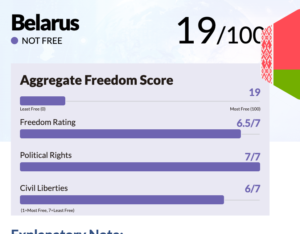Belarusan President Alexander Lukashenko won a landslide reelection according to preliminary results announced Monday that have already provoked protests and opposition accusations of vote-rigging. Police violently dispersed demonstrations overnight (above) with tear gas and water cannon and more clashes could follow as the opposition has vowed to continue protesting, refusing to accept the official election results, while Lukashenko himself promised a “proper response,” The Post reports:
Russian President Vladimir Putin was the second world leader to congratulate Lukashenko on his victory Monday; China’s Xi Jinging was the first. The European Union said in a statement that “election night was marred with disproportionate and unacceptable state violence against peaceful protesters.”
“Following their unprecedented mobilisation for free elections and democracy, the Belarusian people now expect their votes to be counted accurately,” the statement said. “It is essential that the Central Electoral Commission publishes the results reflecting the choice of the Belarusian people.”
 It was the darkest day in Belarus modern history, pro-democracy activist and journalist Franak Viačorka (below) tweeted while in hiding.
It was the darkest day in Belarus modern history, pro-democracy activist and journalist Franak Viačorka (below) tweeted while in hiding.
” The [official] The results of the exit polls show that Lukashenko has not made and will not make any concessions to the opposition. He just shows his total power with these crazy numbers,” he told AFP. “It’s a signal to the opposition that he’s going to destroy them.”
There was no doubt that Ms Tikhanovskaya had received more votes than Mr Lukashenko, Viacorka said. “But that’s not enough. The major competition takes place in the streets, and without Internet or correspondents [to witness] – and Lukashenko has the soldiers, the army and the KGB by his side.”
The election was “a farce and a circus. … Candidates were imprisoned, observers were beaten and arrested, many voters were not allowed to vote,” he told the Washington Examiner, adding that the “regular army is in the cities. It all looks like Lukashenko is declaring war on his own people.”
But the restoration of the internet today has revived his optimism.
“I thought it was the end,” he told the BBC today. But the thousands of on-line messages and posts have confirmed that “we’re stronger, we’re the majority.”
 MEMO98 monitored the election and and concluded that Lukashenka used every trick in his playbook to try and suppress the opposition and survive this election. But his playbook is outdated and while dominating all traditional state media, it adds, noting that he ignored a vibrant, organic opposition movement on social media.
MEMO98 monitored the election and and concluded that Lukashenka used every trick in his playbook to try and suppress the opposition and survive this election. But his playbook is outdated and while dominating all traditional state media, it adds, noting that he ignored a vibrant, organic opposition movement on social media.
It was the darkest day in Belarus modern history. Government waged a war against his people, brought army in cities, and targeted unarmed people with pepper spray, water cannons, guns and stun grenades. pic.twitter.com/zBDGJ2T4Ie
— Franak Viačorka (@franakviacorka) August 9, 2020
Demonstrations and rallies in the run-up to Sunday’s vote suggested a groundswell of support for Svetlana Tikhanovskaya, the 37-year-old wife of popular YouTuber Sergei Tikhanovsky, who had planned to contest the election before he was detained in May for allegedly inciting unrest, The WSJ reports:
Instead, Belarus’s election commission Monday confirmed 65-year-old Mr. Lukashenko’s winning margin despite simmering resentment over his heavy-handed rule and erratic handling of the coronavirus, setting the stage for a protracted confrontation. Ms. Tikhanovskaya received just under 10% of the vote, with turnout at 84%.
“This is a propaganda PR campaign carried out by pro-government organizations,” said Valery Karbalevich, an independent political analyst in Minsk. “Their function is to legitimize the election results.”
Prospects for a democratic breakthrough appear to have been frustrated, but the opposition’s response impressed observers.
 “It’s certainly the biggest protest I’ve ever seen in Belarus since Lukashenko came to power,” said David Marples, a professor at the University of Alberta and an expert on Belarus. “In terms of the elections that Lukashenko’s held, there’s been nothing like it. It seems to me that the whole country really is in favour of change.”
“It’s certainly the biggest protest I’ve ever seen in Belarus since Lukashenko came to power,” said David Marples, a professor at the University of Alberta and an expert on Belarus. “In terms of the elections that Lukashenko’s held, there’s been nothing like it. It seems to me that the whole country really is in favour of change.”
The decision to put down the protests violently has raised questions about the loyalty of interior ministry troops and whether Lukashenko’s own nerve could fail if he felt personally threatened by the protests. “We don’t really know how brave he is. He’s never been in a situation where he needs to be brave,” Marples told The Guardian.
Will claims of foreign interference by Lukashenko succeed in distracting voters, or will he use them as a pretext for a crackdown? The Atlantic Council asks. Will the outcome of the election change Belarus’ politics? How will the results affect Belarus’ relations with Europe, Russia, and the United States? Can popular will bring about a genuinely democratic election in spite of government crackdowns on dissent and free information?
Join the Atlantic Council’s Eurasia Center for an online event, Breakthrough in Belarus: A democratic opening? (above), on Tuesday, August 11, 2020, from 10:00 to 11:00 a.m. (EDT) via Zoom. To join the event, register here.
Konstantin Eggert, columnist at Deutsche Welle; Natalia Kaliada, co-founding artistic director and CEO of the Belarus Free Theatre; Hanna Liubakova, journalist at Outriders; and Franak Viacorka, vice president of the Digital Communications Network, analyze the election results. Christian Caryl, editor at The Washington Post, moderates the discussion.







